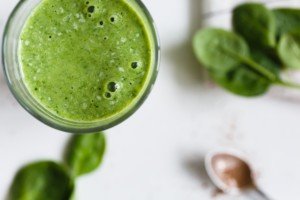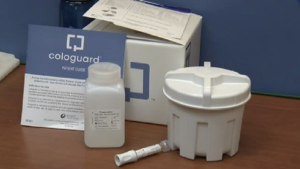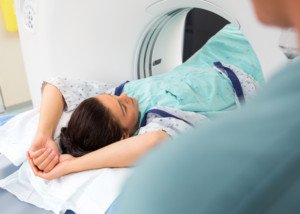
Colon cancer isn’t the only cause of black stools.
“Stools can be dark green or even brown, and if it is dark, it’s okay,” says Sander R. Binderow, MD, FACS, FASCRS, with Atlanta Colon & Rectal Surgery.
“The color, consistency and smell of a stool are for the most part not as important when it comes to diagnosing a disease or colorectal cancer.
There are certain foods that we eat which choose the color of the stool.”
Dr. Binderow says that in general, the characteristics of BMs are caused by the environment, including food and beverage intake.
If your stools appear to be black, and especially if you don’t have concerning symptoms with this, like loss of appetite, unexplained weight loss, abdominal pain and undue fatigue, re-evaluate what you’ve been eating lately.
Yes, colon cancer can cause stools to be black, “black like tar,” says Dr. Binderow, “different from just a dark brown.”

Shutterstock/Ronald Plett
This is because if colon cancer is up high enough in the digestive tract, the blood from the bleeding gets digested before it exits the anus, resulting in that tar-black color — that then gets mixed with BMs.
Another cause of black stools is from iron, says Dr. Binderow.
“When people are anemic and take iron [supplements], the stool could be black.
“If someone shows up at their doctor’s office, and they have anemia, and the most common cause of anemia is a colon tumor, so they are screened for tumors immediately through colonoscopy.”
Spinach and beets may cause BMs to appear black, especially if viewed in dim light or you don’t have sharp vision.

Under good lighting and wearing vision correction if possible, inspect your poops closely.
Remove a sample from the water and take a good look.
You may then find that what initially appeared to be black is actually a very dark green or purple.
Other foods that can cause this include licorice, dark chocolate, blueberries, cranberries, grape juice, foods with red dye and iron-rich foods (meat, prunes, tofu, oysters, kidney beans, raisins, molasses).
In general, a junk food diet or diet based in highly processed foods results in darker BMs.
Other Causes of Black Bowel Movements
Acute gastritis, cancer (esophageal, stomach), colon polyp, Crohn’s disease, swollen blood vessels in the esophagus, and ulcer.
Dr. Binderow adds, “If a patient does not want a colonoscopy and they are over 50, at average risk of colorectal cancer, they could also take an at-home non-invasive colorectal screening test to test for precancerous and cancerous polyps.”

Cologuard is a non-invasive screening test for colon cancer using the latest advances in stool DNA technology — detecting altered DNA from abnormal cells in a stool sample which could be associated with cancer or precancer.
Update on Age to Start Colonoscopy Screenings
The age for getting one’s first screening colonoscopy was changed to 45 by the American Cancer Society in 2018.
This change was a response to an increasing incidence of colorectal cancer in women and men under age 50
 Dr. Binderow performs minimally invasive, robotic and laparoscopic surgery for Crohn’s disease, ulcerative colitis, colon cancer and other colorectal conditions. Adept at routine procedures, he also sees patients with complex, atypical maladies.
Dr. Binderow performs minimally invasive, robotic and laparoscopic surgery for Crohn’s disease, ulcerative colitis, colon cancer and other colorectal conditions. Adept at routine procedures, he also sees patients with complex, atypical maladies.
 Lorra Garrick has been covering medical, fitness and cybersecurity topics for many years, having written thousands of articles for print magazines and websites, including as a ghostwriter. She’s also a former ACE-certified personal trainer.
Lorra Garrick has been covering medical, fitness and cybersecurity topics for many years, having written thousands of articles for print magazines and websites, including as a ghostwriter. She’s also a former ACE-certified personal trainer.
.
Top image: ©Lorra Garrick









































